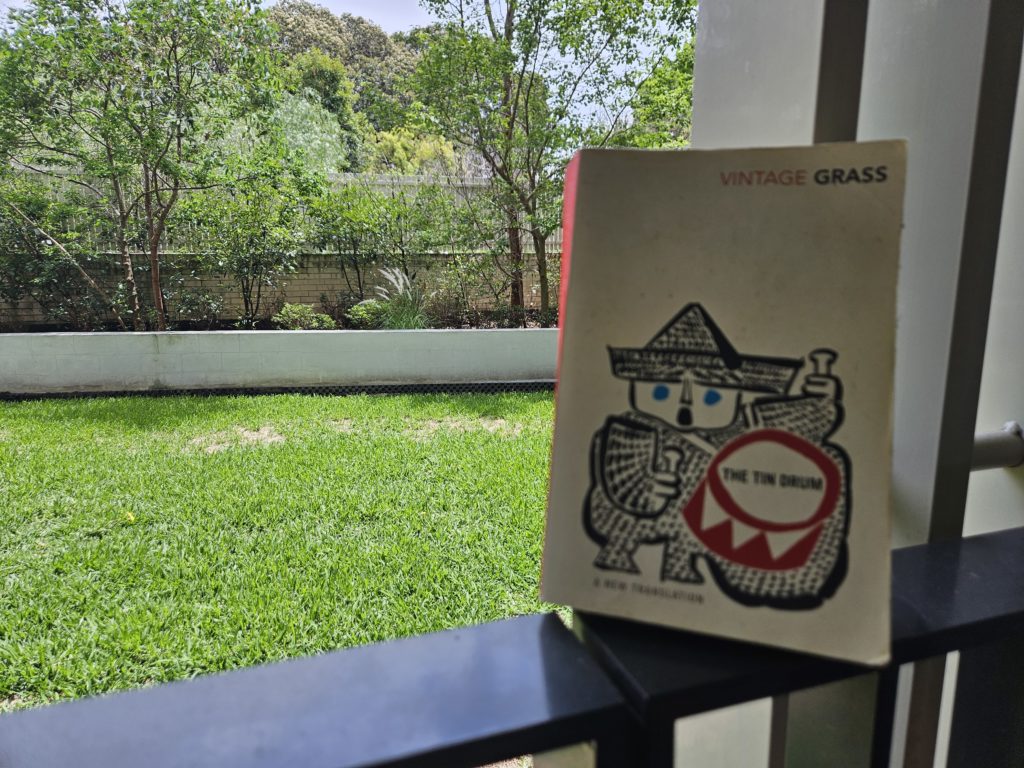I’ve been away for a good long while. The reason for this blog’s creation was taken away when I sold my business. Namely, I had the freedom to travel again, and the necessity of trying to see the world from the comfort of my apartment on my day off was removed. Coupled with the daily grind of adapting to a new career and a fair degree of good old fashioned writer’s block the reasons for my lack of output are obvious enough. But the fact is, reading back over old entries I realised I missed the process of creating. So yes, I’m back. The Erstwhile Tourist is born again, albeit having visited Spain and Portugal last year, but I’m hardly going to change the name of the blog now.
So without any further pontificating, here goes.
watch
The Captain, (Robert Schwentke) Max Hubacher, Frederick Lau, Milan Peschel, Eugenie Anselin. 2017
The act of desertion from combat, or going AWOL as it has become known in modern parlance, is an oft frowned upon practice. Generally associated with cowardice and treason there are few statues commemorating the Great War deserters on display in town squares and public parks around the world. Germany is a notable exception, so notable in fact that the country has erected more than 50 such structures, some remembering specific individuals, others honouring the spirit of the act itself. It’s a fine initiative, another Germany is employing in continuing to grapple with its terrible modern history. Courage comes in different forms, and many of Nazi Germany’s estimated 100,000 deserters paid the ultimate price for running away when staying to fight was unconscionable to them. But it stands to reason that not all deserters did so for humanitarian reasons and were actually ruthless opportunists. Willi Herold was one such individual.
Director Robert Schwentke’s exciting film finds him back on home soil after a string of Hollywood duds chronicling with a fair degree of creative licence the final weeks of Herold’s life. From its opening reels following Herold desperately fleeing a military patrol of drunken marksmen, The Captain grabs the viewer’s attention and doesn’t relinquish it until curtains. The remarkable true story of a Nazi deserter who happened upon an abandoned vehicle with a full Captain’s uniform in it and used his talent for imitation and confidence to embark upon a killing spree is as bleak as the black and white lens Schwentke employs to bring it life, but he does so with a frenetic energy and razor sharp gallows humour. Herold’s improbably quick-fire escalation through the Nazi ranks is as sordid and at times depraved as one might expect but the movie is nonetheless endlessly watchable.
In the title role young Hubacher is superb, gradually letting the viewer in on the depths of Herold’s depravity as he climbs the military ladder with the flimsiest of cover stories. Employing a group of similarly errant soldiers to assist him on his travels, his dreadful mission reaches its critical point at a concentration camp as the war draws to a close. As the movie does likewise, the viewer begins to feel ensnared in a hellish fever dream. In choosing this story to tell, the director gives us an alternative way that individuals might react to tremendous adversity given they have a sufficient level of evil lurking within their hearts. 4/5
Stream@: https://www.sbs.com.au/ondemand/watch/1814279235747
The Baader/Meinhoff Complex, (Uli Edel) Moritz Bleibtreu, Martina Gedeck, Johanna Wokalek, Bruno Ganz. 2008
Nominated for best foreign language film at the 2008 Oscars, Complex works nicely as a sprawling epic detailing the life and times of some of Germany’s most notorious criminals. Equally it serves as a timely reminder that terrorism can be homegrown and is not simply a phenomenon of the Arab world. Where it’s less successful is in its root cause examination of violence against the state. By paying lip service to its subject’s motivations, Edel’s movie is uneven and worse still, perhaps wilfully ignorant. His recreation of a 1970’s Berlin stalked by grisly violence is rich in period detail but fails to deliver his promise of making a film “as authentic as possible” when adapting Stefan Aust’s 1985 non-fiction book of the same name.
The Red Army Faction was a group of far left extremists who formed in the early 70’s headed up by, among others, Andreas Baader, a violent thug masquerading as political idealist and Ulrike Meinhoff, liberal activist mother of two turned chief RAF co-ordinator. Influenced greatly by the teachings of Marx, appalled by their parents’ generation’s meek acceptance of post Nazi West Germany and desperate for meaningful change, the Faction would eventually take matters into their own hands. Perpetrating several high risk bank robberies to fund their program the group would soon graduate to full-blown terrorist activity. After bombing an American army base and local police stations the RAF became the subject of a nation wide manhunt. Eventually the original ringleaders of the group would die in prison from apparent suicide, but not before repeated hunger striking and appeals to have their sentences overturned.
These are the events that are outlined in Complex with varying degrees of competence. The early scenes laying the foundations for the RAF’s formation are thrilling, particularly an inch perfect re-enactment of the Shah of Iran’s 1967 visit to Berlin complete with peaceful protest crushed by a brutal police presence. The RAF’s early stages trip to Jordan for a terrorist training camp is also superb and unexpectedly funny. However in its brief attempt to portray the faction’s members as real people with motives the movie fails badly. Most members come off as bloodthirsty lunatics, in it for psycho-sexual thrills as opposed to having any real ideals. Additionally, the movie soft-pedals jail conditions for the group once arrested, thus painting their hunger strikes and appeals as the whining of spoilt brats rather than the results of state sponsored heavy handedness. Finally and perhaps most damningly, the suicides of Baader, Meinhoff and co. are presented as indisputible facts when in reality there is to this day a great deal of conjecture over the credibility of the evidence presented.
More informed pieces have been written regarding the accuracy of Complex, for example historian Klaus Neumann’s brilliantly crafted think piece “The past as it wasn’t“. From that vantage point this review may well read as a blogger regurgitating a more qualified writer’s work. Perhaps there’s some truth in that but the fact is, watching the movie without any prior knowledge of events lead this reviewer down a fact checking rabbit-hole. In a lot of ways The Baader/Meinhoff Complex is a worthwhile viewing experience, capturing a specific moment in history fraught with unrest and violence and certainly from a technical standpoint is well worth checking out. Perhaps do so with the intention of doing a bit of research afterwards. 3/5
stream@: https://www.sbs.com.au/ondemand/movie/the-baader-meinhof-complex/1423100483518
Blood Red Sky, (Peter Thorwarth) Peri Baumeister, Kais Setti, Alexander Scheer, Dominic Purcell. 2021
Much like Domino’s on a Tuesday night, Thorwarth’s movie ambitiously strives to deliver its target market two for the price of one. In setting his vampires on a rampage movie onboard a hijacked Berlin to New York flight he’s taken two well trodden genre staples and mixed well, in the hope that the potentially combustible ingredients might combine to light up screens everywhere. Unfortunately the comparisons with Domino’s don’t end there. The novice director’s value package approach fails to realise an inescapable truism:that a double serving of mediocrity is more than twice the amount you ever really needed.
Single mum Nadja, boards the fateful flight with young son in tow sporting a grim demeanour and deathly pallor. The presumed deadly illness that has her heading to the Big Apple is unspecified, but when a rag-tag bunch of terrorists make their presence felt mid-trip her condition worsens markedly as her blood-lust grows. Prematurely long in the tooth, Nadja now has a group of deserving targets to practice her nocturnal activities on. Manning the ill-defined hijack mission is Berg (Australia’s own Purcell, perhaps finding life after Prison Break a bit of a grind) the no nonsense leader struggling to reign in his team particularly the overtly theatrical, flamboyant psychopath mystifyingly named Eightball (Scheer, in a performance parachuted in from another movie altogether). Sandwiched in between flashbacks that shed light on Nadja’s condition, the bodycount rises but it’s a desperately uneven affair.
It’s a fun enough premise, and when the plot twist is revealed half an hour in you are excited by the potential of a schlock classic unfolding before your eyes. An hour later you find yourself, patience worn thin, wondering how the hell there’s still half an hour to go. Formulaic action scenes and thoroughly uninspired dialogue combine for a final product that is overcooked, overlong and surprisingly joyless. In the lead role Baumeister, aided by strong visual effects, gets the tone right but isn’t helped by lines that give her very little to work with. Where punchy one liners might have helped elevate the material, performers time and again have to make do with four letter exclaimers to convey their assessment of the situation.
It’s a case of missed opportunities for Horwarth and co. And whilst there are passages here that show promise, the quantity over quality approach never really threatens to satisfy. 2/5
stream@: https://www.netflix.com/watch/80198645?source=35
read
The Tin Drum, Gunter Grass 1959.
Oskar Matzerath is a tough hang. Time spent in his company makes an evening with Ignatius J Reilly seem a carefree unison of like-minds by comparison. If his insistence on taking his instrument of choice wherever he goes is grating, its grossly exacerbated by his reaction to having to part ways with said apparatus. Add to this the key role he played in each of his immediate family’s demise and you’re left with a largely irredeemable character. By any modern metric, Oscar sucks. But if the prospect of grabbing a beer or binging the new Stan series with Oskar is galling, you should try reading 500 plus densely worded pages he’s narrated.
The Tin Drum is a novel that gets its share of admiration. Generally the praise lavished upon it is done so by critics more qualified and erudite than this one. Yet I feel oddly at piece and in fact largely liberated in saying that Grass’s much loved opus is an almighty slog. Me aiming a few barbs in its direction is hardly going to tarnish its reputation after all. The novel’s central conceit, that of a boy who voluntarily stops growing aged five and emits a squeal high pitched enough to shatter glass when things don’t go his way, the stuff of glib fantasy in a novel generally steeped in dreary worldliness. Meanwhile Grass’ bloatedly indulgent syntax plunders on irrepressibly for the novel’s duration. Not since Joyce’s Ulysee’s have so many words been dedicated to so little.
The Tin Drum is indeed an ordeal to get through. Much has been said about the novel being a metaphor for post WW2 German guilt. But to this reader at least, that message failed to transmit, bogged down as I was under page after page of over-written cerebral philosophy. It’s not an exaggeration to suggest the hours I devoted to Grass’ magnum opus were hours grossly misspent. Wasted time is certainly no rarity in this the age of idle hands prodding at portable pocket-sized computers, and l can think of even less rewarding ways to while away the hours, but let’s just say I won’t be checking out the film adaptation.

Copy generously sent to me via Book Depository by my father during lockdown.
listen
Nena
99 Luftballoons is a flat out masterpiece. Conceived by Nena guitarist Carlo Karges at a Rolling Stones concert in West Berlin in the early 80’s, Balloons packs an epic tale of Government paranoia and the end of the world into four irrepressibly bouncy minutes. Released in 1983, dystopian nightmares had never sounded so infectious before and haven’t since. Over a pulsing synth line, the story of red balloons floating in the sky near the Berlin wall being mistaken for military targets causing escalating tension and full blown nuclear war unfolds. It’s a masterclass in economic story telling and is at once amusing, thought-provoking and eventually quite moving. It’s also one of the more enduringly recognizable pop hits of the 1980’s.
The band Nena were formed in West Germany at a pretty bleak time. Where Luftballoons achieved greatness was in its dual accomplishment of bringing a timely antiwar message to public consciousness and providing joyous music for a populous perhaps without a great deal to smile about. Karges wrote the lyrics and keyboardist Uwe Fahrenkrog Peterson composed, but at the centre of it all was of course Gabrielle “Nena” Kerner. Nena’s vocalising manages to convey melancholy as well as a youthful optimism which the song doesn’t quite work without. She encapsulates the innocence of youth into these words written for her without becoming over-awed by the task at hand.
99 Luftballoons (and its English language reworking Red balloons) are the only songs Nena are known for outside of Germany. But their self-titled debut album is a fun listen from start to finish. Unmistakably mid 80s, Nena packs tune after tune into its tracklist that evoke feelings of a simpler time, namely childhood. Indeed, the whole album sounds like it could’ve been used as the soundtrack for the Karate Kid or Teen Wolf. If this sounds like a backhanded compliment it really isn’t. Outside of the main attraction, Kino and debut single Nur getraumt are boyant highlights. With uncertain times ahead and the world teetering on the brink of a crisis of a different kind, perhaps we could all do with a little Nena in our lives.
99 Luftballoons as well as the rest of Nena’s output is available for download on Spotify.
eat and drink
Hahndorf Inn, 35 Mount Barker Rd, Hahndorf, South Australia, 5245
Should you find yourself in Adelaide for a long weekend you could do plenty worse than jumping on a bus into the hills for an afternoon in historic Hahndorf town. Something of a cultural oddity in Australia in that it’s a township with non British roots, Hahndorf is day-trippers’ delight. Established in 1839, when after a voyage of 129 days, Captain Dirk Meinhertz Hahn dropped anchor off the coast of South Australia with a boatload of displaced Lutherans in search of a new home. The refugees had fled a life of persecution in Hamburg (then of Prussia) but were for the most part well received in South Australia, their general cleanliness and dare I say it, efficiency, a boon to a recently colonised nation still setting up shop. So indebted were these settlers to the Captain that they named their new home after him. Thus Hahndorf was born.
Today Hahndorf passes easily as any-town Saxony or Bavaria, one of those you could walk through in an hour but happily stay at for a week. But don’t expect an undiscovered gem, Hahndorf is generally rammed with tourists. This is no surprise as it has plenty to offer, and halfway down the main drag you’ll find the Hahndorf Inn, a German themed pub/restaurant which will unlikely disappoint your average beer enthusiast or homesick Kraut.
It’s worthwhile booking ahead to secure a table in the beer garden so you can grab a stein and watch the world pass by while you wait for your meal. German beer is of course exceptional so you’re in safe hands, but perhaps start off with the light and crisp Helles if you’re opting for a litre glass. Beer paddles are also available and a good option if you want to try a bit of everything (and let’s face it, why wouldn’t you?) Food options are plentiful but provided you’re not dining alone the Taste of Germany platter is a great way to spread your net. From here the $20 crispy pork knuckle upgrade seems like an absolute no-brainer. German cuisine is often associated with quantity rather than quality so in that same spirit why not over-indulge?
If your inclination is to shy away from the platter then there are plenty of alternatives. All the German favourites from traditional Hot Dogs with sauerkraut and cheese kransky to beef Wiener Schnitzel are present and avaialable and are unlikely to leave much room for dessert. Since you’re not driving why not grab a second stein and make an afternoon of it. Let the Hahndorf Inn become the centrepiece of your visit to this quaintly charming location.


goal of the month
Fast forward to 1.38 minutes for Mitchell Weiser’s tasty decider for Werder Bremen against the club where he was deemed surplus to requirements, a certain Bayern Munich. Weiser dances down the right flank, outmuscles Alphonso Davies and rifles into the roof of the net from the tightest of angles. How sweet it must have felt.